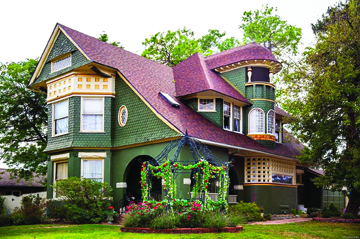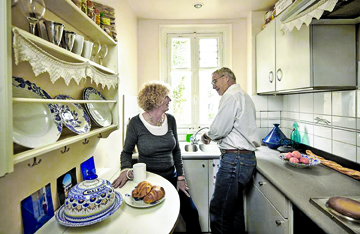Value Has Grown To $112 Million In Just 12 Months; Complaints Soar As Homes Become The Motel Next Door
by Glen Richardson

Highlands Hot: Unique and nostalgic homes have made short-term rentals in the Highlands neighborhood one of the hottest.
Valley neighborhoods are becoming more and more concerned about short-term rentals by homeowners through Airbnb and others. Their complaint is about the stream of homeowners, some new, renting the house next door for days or up to a few weeks. In neighborhoods such as the Highlands and the Golden Triangle many say the annoyance is progressively on the rise and threatening to escalate into citywide anger and fury.
That’s not a big surprise to Denver: Between January and July of this year the city received 112 complaints concerning primary residence, typically from local neighbors. Furthermore, residents contend that it’s unfair to expect neighbors to be the driving force behind legal compliance.
More than a year and a half after the City of Denver first tried to crack down on short-term rentals, the blossoming industry — buoyed by thousands of new homeowner hosts — has consistently stayed steps ahead of regulators. City records, combined with data provided by Denver-based analytics firm AirDNA reveals incessant problems with the city’s efforts to control a market that is bringing in more than $100 million a year.
Compliance Collapse
According to a study done and reported by BusinessDen — a website for local business news — less than half of the city’s known short-term rental landlords comply with licensing regulations. The bottom line, the study concludes: “The primary-residence requirement, designed to calm the fears of homeowners that their residential neighborhoods could become dominated by the motel next door has proven toothless and largely unenforceable.”
Denver’s Department of Excise & Licenses says the compliance rate is down due to the surge in people listing short-term rentals in the city. That’s because short-term rentals in Denver have grown in value to at least $112 million in the last 12 months. Moreover, it’s expected to top $200 million by 2021. AirDNA figures also show that properties in prime locations have annual cash flow topping six figures.
In only eight years San Francisco-based Airbnb’s initial plan to allow homeowners to host business travelers in a spare bedroom or to rent their family home to tourists while they’re out of town has made it a $25 billion c

Home Away From Home: Price versus hotels and all the comforts of home have given a big boost in demand for short-term rentals.
ompany. The reason is simple: In comparison to prices for staying in a hotel the cost of a short-term rental is significantly lower. A short-term one-bedroom home in Denver often starts as low as $50 per night. With a hotel there’s typically a bed, a television and maybe a desk and chair. With short-term rentals travelers think they’ve never left home.
Seeking Visitor Dollars
Recognizing the economic benefit to the city coming from short-term rentals Visit Denver — the private, nonprofit association that markets metro Denver — touts on its website that the city has approved and is licensing short-term rentals. The site does urge visitors: “If you are visiting Denver and interested in renting a home, or part of a home, for fewer than 30 days, make sure that you rent from homeowner-hosts who are licensed by the City and County of Denver.”
Denver’s rules don’t allow property owners to run more than one Airbnb location other than a basement or carriage house. Nevertheless, AirDNA records indicate that at least 39% of the city’s properties are offered full-time year-round. More: Another 17% run more than one property. Furthermore, multi-listing hosts account for 40% of Denver’s rentals on Airbnb or about 2,000 listings.
Excise & Licenses has only a single compliance officer to handle 2,200 unlicensed rentals plus another 2,000 listings run by mult

Area Anxiety: Residents worry growth of short-term rentals in Denver’s most popular neighborhoods will change their character and transform the quality of life.
i-unit hosts (prohibited altogether under Denver law). The department’s six inspectors help with short-term rental issues but also deal with the city’s 180 other business licenses plus evolving industries such as marijuana. George Mayl, president of Inter-Neighborhood Cooperation (INC), says it best: “They’re undermanned and understaffed.”
Beginning April 1 of this year Airbnb started collecting Denver Lodger’s tax on sales of short-term lodging. The deal resulted in the city receiving $3 million while not forcing short-term rental property owners to send taxes to the city. During the same period Airbnb made $69 million from rentals. Based on AirDNA data, the city should have received more than $7 million.
Property Value Impact
There is a lot of talk among property owners about short-term rentals and their impact on real estate values. One of the most common questions is do short-term rentals increase the value of a particular residential property? Some homeowners feel it can add as much as 40% to the property value due to generating additional income.
Commercial and residential lenders, however, don’t agree. “A short-term rental has zero impact on value and should not be factored in when evaluating a property.”
Why? Regulations, they argue, can and often change overnight. Moreover they point out that permits are very different than a change in zoning which provides much greater certainty for future buyers of a property. Lenders conclusion: “Don’t buy into the hype that the income from a nightly rental will increase the value of the property.”

Quality Quotient: With 82% of Airbnb properties ranked at least 4.5, the online marketplace now publishes a Quality Score of every Denver short-term rental property.
Investor Influence
While lenders don’t see a benefit to short-term rentals professional real estate investors are far more optimistic. The financial benefit of an Airbnb property is clear to some investors: They can make more money from short-term rentals for the same reason vacationers typically spend more on lodging while traveling than they do on rent.
So how many professional real estate investors list properties on Airbnb? And how large are their businesses?
The best way to see whether there is a major trend of professional investors using Airbnb would be to see how many hosts rent out multiple properties on the site. In Denver at least numbers imply that 40% of listings are from multi-listing hosts indicative of probable professional investors. AirDNA, it should be pointed out, helps real estate investors make short-term rental property investment decisions. Thus the presence of professional investors has become controversial. The upshot is that Airbnb has become close-mouthed about disclosing information.
